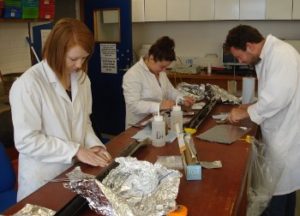 SWAP partners with a major research programme called the Celtic Crannogs Project, which aims to reconstruct life on wetland settlements through analysis of proxy indicators such as insect remains, biomarkers and ancient DNA.
SWAP partners with a major research programme called the Celtic Crannogs Project, which aims to reconstruct life on wetland settlements through analysis of proxy indicators such as insect remains, biomarkers and ancient DNA.
This project builds on previous research by the Universities of Southampton, Plymouth and Newcastle which developed a new methodology for ‘remote sensing’ crannog construction & inhabitation through the analysis of lake sediment cores. This involved a multi-proxy approach utilising pollen, diatoms & insects which relied on the inevitable disturbance to the biology of small lakes caused by crannog construction/use. This project will go far further by applying these techniques alongside a new generation of bioarchaeological methods, particularly geochemistry, lipid biomarkers & DNA metabarcoding in conjunction with archaeological excavation, landscape survey & community involvement.
